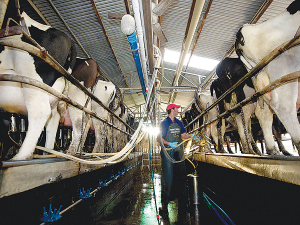Australia's dairy industry is on track for a slight increase in milk production this season.
According to Dairy Australia's latest Situation and Outlook Report, conditions on farm remain relatively favourable.
Australia's current production forecast suggests rise of up to 2%, which would equate to a national milk pool of 8.8 to 9 billion litres.
Dairy Australia senior industry analyst Sofia Omstedt says strong farmgate milk prices have subdued input costs have allowed most farmers to focus their attention on calving and the spring flush.
A wet start to the season slowed milk flows in July, however, drier weather has since helped to improve milk production conditions heading into spring.
After a spike in sales last year, sparked by panic buying as lockdowns took place across the country, shoppers have reverted to pre-Covid trends, with sales of fresh and long-life milk tracking well in line with 2019.
"The vast majority of Australian households regularly purchase milk at 98% and only 2% of buyers exclusively turn to dairy alternatives, so dairy demand continues to be strong," says Omstedt.
"Plant-based beverages remain complementary to, rather than a substitute for, milk."
Meanwhile, global dairy demand has been put to the test as the Covid-19 delta variant spreads across the world.
While a mid-year market lull is common, this year's was exacerbated by new lockdown implemented in key regions, for example in parts of southeast Asia and some provinces in China.
Omsedt says this saw commodity values for most dairy products and trend downwards, however, this price slide now seems to be stabilising.
As dairy demand moves back into growth phase, freight challenges are becoming increasingly prominent as shipping congestion worsens. With new lockdowns and temporary terminal closures, this is projected to remain a challenge for anyone exporting (or importing) products for the foreseeable future.
Omstedt notes that with global supply expected to continue its current growth trajectory, solid ongoing demand will be of paramount importance.
"To date, underlying global demand has proved sufficiently strong and adaptable.
"Nevertheless, rising Covid-19 cases demonstrate that even agile supply chains and strong fundamentals cannot completely offset the impact from consumers facing a new period of prolonged restrictions.
"While Australia's dairy farmers look set to benefit from a wet spring and ongoing profitability this season, the industry more broadly will be keeping an eye out for more curveballs as the pandemic continues to unfold."


















